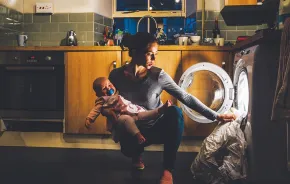A child shows up at school, but is unprepared. Or she doesn't show up at all -- or his absences are unexcused. New bills across the country are aimed at making parents accountable for their kids' performance (or non-performance) in public schools, a shift away from "blame the teacher" policies that have frustrated educators.
...The thinking goes like this: If you look at schools that “work,” as measured by test scores and graduation rates, they all have involved (overinvolved?) parents, who are on top of their children’s homework, in contact with their children’s teachers, and invested in their children’s futures. So just require the same of parents in schools that don’t work, and the problem is solved (or, at least, dented), right?
In Indiana, State Representative Linda Lawson introduced a bill that would require parents to spend three hours per semester volunteering at their child's school. (What would be the penalty for non-compliance? Is three hours chaperoning a dance as effective -- in terms of a child's education -- as three hours spent helping with spelling tests?)
State Representative Kelli Stargel of Florida thinks it would be a good idea to grade parents on their involvement with their child's education, assessing them across measures such as whether children as sent to school prepared and on time.
Parents are objecting to the vagueness of these proposals, which raise more questions than they answer:
They also became bogged down in the problem of definitions. For example: What counts as involvement at school? Selling popcorn at a sporting event? Doing building repairs on weekends? And how do you define good or bad parenting — worthy of a passing or failing grade? Is the mother who sends a child to school with a Pop-Tart in hand a “needs improvement” parent or an “unsatisfactory” one? (Or maybe she deserves a medal for getting anything into the child at all.)
The article doesn't mention differences in parents' educational backgrounds or countries of origin but they have to be taken into account: What looks like proper parenting to some parents might not even occur to others. Is it safe to assume that all parents share a common vision and understanding of what are the right measures to take to ensure children's success in school? Who will end up being most affected by these bills, and what extenuating circumstances should be taken into account (is it fair to expect a single mother working a couple of jobs to show up as a volunteer at school?).
Education historian and author Diane Ravitch says that this isn't the way to encourage parents' participation in schools.
“If we could just find the right person to punish,” she said of the philosophy behind too many education reform plans. “Punish the teachers. Punish the parents. It’s Dickensian. What we should be doing instead is giving a helping hand.”
“Parenting education needs to begin when a woman is pregnant,” Dr. Ravitch said. “The window is open from prenatal days until age 5. And we need to acknowledge that the root problem is poverty.”









